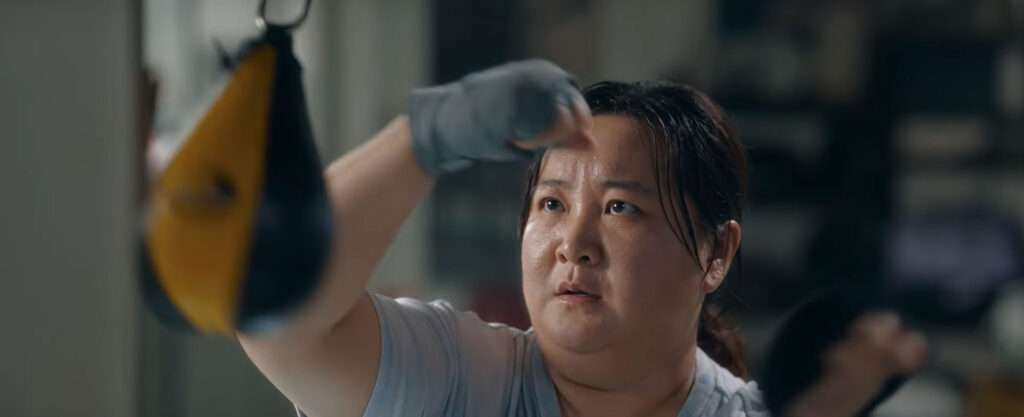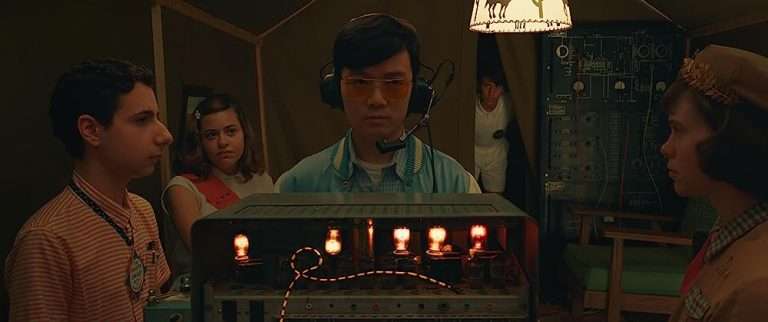Do you want to win, even if only for once? Yes. Of course. This is such an obvious question, even a commercial one—the slogan of a boxing gym flier. Winning, which implies having beaten someone, is the tacit knowledge of having been better at something—a feeling that everyone appreciates—or almost everyone. There are also those who have never won anything. For example, there is Le Ying; she indeed has never won anything. Le Ying (played by Jia Ling, actress and director) is the protagonist of the Chinese super hit “YOLO,” which premiered in theaters in February 2024.
A young woman who is depressed, overweight, jobless, and lacking in interests, living with her parents and spending the days in waiting between meals. She has a sister, Le Dan (Zhang Xiaofei), by whom she is alternately humiliated or exploited. Mainly, Le Dan is interested in hosting Le Ying in the program she works for, a sort of rehabilitation show for stragglers. She also has a boyfriend, who leaves her to marry her best friend.
The merry couple would be grateful if Le Ying attended the wedding as a bridesmaid; it would help keep up appearances. Le Ying, mild-tempered, has the tendency to drift away from conflict, so she decides to leave the family home to live alone while supporting herself with a low-paying job as a waitress. After a providential (or just bizarre) encounter with Hao Kun (Lei Jiayin), a boxing coach in crisis, she decides to join his gym.
Overall, “YOLO” (remake of the Japanese film “100 Yen Love”), which stands for You Only Live Once in the international translation, is a feature film that straddles the line between comedy and drama. The second movie by Chinese director Jia Ling, a former stand-up comedian, upon its release in early 2024, has established itself as a massively popular phenomenon in its home country. On the one hand, it was a huge box office success, and on the other, the outcry over the real physical transformation of the protagonist, for whose performance Jia Ling put on 20 kg to later lose about 50 kg. Not that the film is about weight loss. Or about the cathartic power of sport. Rather, it is the story of a woman who decides for the first time to bet on herself. To win, just for a change.
Despite its simplicity, the film manages to be incisive in conveying its message, counterbalancing the dramatic setting of the story with a light but quite functional comedy. Although the parable of self-affirmation may be overused in the contemporary cinematic landscape, Jia Ling is able to bring a fresh and yet not so naïve depiction of the subject. The idea of victory is not as social redemption, not as prevailing over someone, but in the very practical step from wanting to improve oneself to actually doing so. Indeed, even though the film culminates in the boxing match with real-life champion Zhang Guiling, Le Ying’s first true victory is over the version of herself that never thought she could pull it off. External success is just something that follows.
On top of that, the reality of Jia Ling’s journey makes Le Ying’s character appear so believable. As mentioned, the director, formerly known as a comedian whose persona was burdened by perpetual stress, personally undertook a physical transformation so intense to be able to practice boxing competitively in real life as well. Beyond the nevertheless effective performance, the result is the genuineness brought by the experience of Ling.

The woman we see on the screen actually overcame her limits, and it is visible both in the real person off-camera and its cinematic counterpart on-camera. Well thought out also is the choice in the portrayal of a healthy and aspirational physique as a strong physique, rather than one meeting the Eastern patriarchal standards of baiyoushou beauty, i.e., slender and childlike bodies. To emphasize the aspirational power of the story is the sudden increase in gym memberships and support groups in the Chinese female population at the same time as the film’s national release.
The performances of the rest of the cast are also compelling, particularly Lei Jiayin, a famous Chinese actor here starring in the role of the boxing instructor Hao Kun. As opposed to Western-style masculine ideals such as Million Dollar Baby’s Clint Eastwood, Hao Kun is the implicit refutation of the idea of salvation embodied by (male) characters external to the main one. Rude and prone to selfishness, Hao Kun is simply yet another person who approaches Le Ying for personal gain. The other supporting characters’ presence is also functional, ranging from the conflict of family dynamics to the comic relief of Le Dan’s quirky TV show hosts.
On the technical side, Jia Ling proved to be knowledgeable behind the camera, achieving a clean but efficient direction and reasoned management of pace and tone, able to make the viewer laugh when needed and be moved when necessary. Also appropriate are the musical choices, as well as a smooth soundtrack that is well integrated with the narrative.
A generally successful film, nevertheless, reflects narrative and directorial choices that are still immature, offset by the palatability of the real story on which it relies. Jia Ling still confirms herself as one of the most interesting talents in the comedy scene in recent years, as much as one of the freshest faces in Chinese cinema. Given the enormous commercial and local critical success so far, it will be interesting to observe in which direction the director will opt to move in her future filmography, projected as one of the most influential within Asian cinema in the coming years.
Freshly unveiled on the international festival scene in Italy at the last Far East Film Festival, “YOLO” is also the first film from mainland China for which Sony (already working with the director on an English-language remake of her debut feature, “Hi Mom”) has acquired international distribution rights. Coming soon with wider international distribution, “YOLO” is recommended both as a manifesto of contemporary Chinese commercial cinema and as a powerful inspirational story.


![The Commune [2017] : Habitat International Film Festival 2017 Review](https://79468c92.delivery.rocketcdn.me/wp-content/uploads/2017/04/The-Commune-2016-Featured-768x365.jpg)


![All U Need is Love [2021]: ‘NYAFF’ Review – A Quarantine caper solely for Hong Kong Cinema Enthusiasts](https://79468c92.delivery.rocketcdn.me/wp-content/uploads/2021/08/All-U-Need-is-Love.jpeg)

